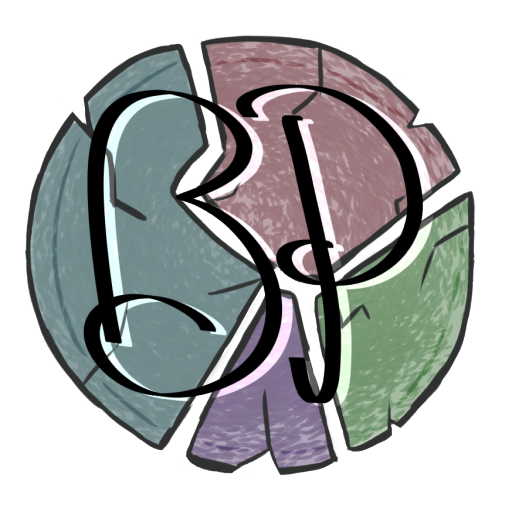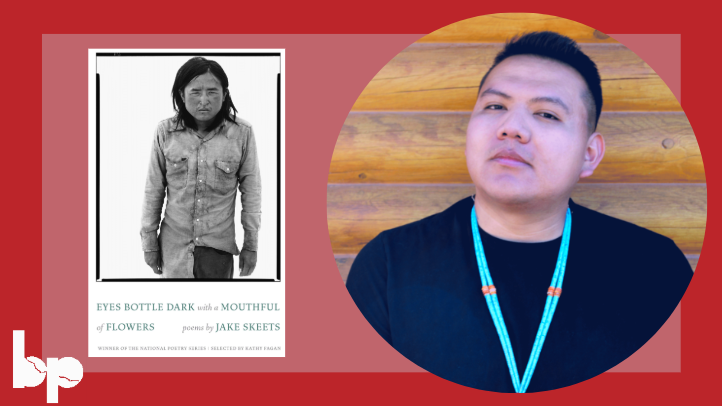 Jake Skeets is Black Streak Wood, born for Water’s Edge. He is Diné from Vanderwagen, New Mexico. He is the author of Eyes Bottle Dark with a Mouthful of Flowers, a National Poetry Series-winning collection of poems. He holds an MFA in poetry from the Institute of American Indian Arts. Skeets is a winner of the 2018 Discovery/Boston Review Poetry Contest and has been nominated for a Pushcart Prize. Skeets edits an online publication called Cloudthroat and organizes a poetry salon and reading series called Pollentongue, based in the Southwest. He is a member of Saad Bee Hózhq́: A Diné Writers’ Collective and currently teaches at Diné College in Tsaile, Arizona.
Jake Skeets is Black Streak Wood, born for Water’s Edge. He is Diné from Vanderwagen, New Mexico. He is the author of Eyes Bottle Dark with a Mouthful of Flowers, a National Poetry Series-winning collection of poems. He holds an MFA in poetry from the Institute of American Indian Arts. Skeets is a winner of the 2018 Discovery/Boston Review Poetry Contest and has been nominated for a Pushcart Prize. Skeets edits an online publication called Cloudthroat and organizes a poetry salon and reading series called Pollentongue, based in the Southwest. He is a member of Saad Bee Hózhq́: A Diné Writers’ Collective and currently teaches at Diné College in Tsaile, Arizona.
___
Taliyah Jarrett & Jacob Garrett: Can you tell us more about the poem “Eyes Bottle Dark with a Mouthful of Flowers” and what inspired you to have it as the title of your collection?
Jake Skeets: The title came first. I was just thinking about images and the image of dark brown eyes is one I had wanted to capture. So I thought about things that were that color. It wasn’t until a trip back home to Vanderwagen to visit my family that I realized that some beer bottles are that dark brown color but if you hold them to the sun, they will appear lighter and that was the type of eye color I was thinking about. So the image became bottle-dark eyes. I figured I needed to complete the image of a face but I wanted that to be not as ominous. I talk about fields a lot in my collection and the flowers that make up those fields are unique. They are not like the flowers we see in suburban homes. I am specifically referring to desert flowers. In Diné, we believe that all words spoken or written are sacred and should act in that way. So I thought about the image of a mouth speaking beautiful words and those words become flowers.
The poem came after, however. I read through many articles of folks losing their lives in Gallup, New Mexico (the setting for the collection). There are many stories of people losing their lives near the train tracks. In my family and friends, there has been loss to trains and train tracks as well. So I wanted to pair this title with this poem to capture that narrative. Of course, at the end, the flowers mentioned are flowers native to our area and some are used in healing ceremonies. So it’s a way to give back to the idea of sacredness. It’s also a way to come to terms with such grief, the concept that there are plant life that are still medicine beneath the ones we lose.
TJ & JG: You address Diné culture in a lot of your poems like in “Drunktown” and “Red Running into Water.” Can you tell us more about Diné, what it means to you, and why you chose to center your poetry around that topic?
JS: I was raised in a checkerboarded area of the reservation in New Mexico. This means I had access to a lot of things that some who live in deeper parts of the reservation did not. This means that my parents and some grandparents also went through boarding and public schools. I wasn’t raised speaking Diné or attending ceremony often. It was present, however, and I thank my family for keeping that present for us and their grandchildren. But I did grow up with enough of it to understand its depth, its surroundingness, its everlasting presence in the way we think and live our lives as Diné. So it would be hard to write without those factors.
I do try to keep much of it from the reader. There are only some moments where I let the reader into the life and thought way of Diné universe. Those poems and other areas are those small moments where I offer to the reader some balance and beauty so they are aware that this is not about tragedy but about existence and balance.
TJ & JG: What made you want to incorporate white space in your poems? Do you think they would convey a similar message without this space?
JS: The white space was meant to function in a lot of ways. First, I thought about the white space of my uncle’s portrait. I was also thinking through the idea of field and the idea that when presented something empty the reader should not assume it actually is empty. I also learned, in time, that the white space could act as whiteness and the way language and poetry of my communities are always spoken in resistance to whiteness. There are imperfect moments where lines are so enjambed they are cut-off and it leads to entire pages of white space. I borrow this technique from Sherwin Bitsui where he borrowed from Diné weavers that there should be these imperfect moments for the soul of the artist, the speakers, the characters, the land and prayers to escape the design and structure of the thing itself. So, in a way, the white space are pathways in and out of the collection. I don’t think the poems operate at all without the white space as the white space itself is part of the poem the same way canvas is to a painting and warp to a rug.
TJ & JG: Can you tell us more about “chiasmus” and why you chose to use it in your poems? Furthermore, what inspired you to use repetition in your poems?
JS: I am a huge of chiastic structure because that’s a structure I found often when learning how to speak Diné. The Diné phrase and English translations are often opposite in order though meant to be parallel in meaning. For me, this is the basis for a strong chiasmus. I wanted these structures to exist because that’s the way language exists for me in this moment. I am still trying to learn Diné and my brain is always re-ordering sentences and thought to the language. I also try to mimic chiasmus in the bible with some lineation within the collection.
Repetition is song. I think every poet uses repetition for the sake of song. Where I am from, song is also prayer and story. So I use repetition to get to prayer and story through the song of poetry.
TJ & JG: Your poetry focuses on men and particularly what men represent. Why did you want to write about this topic?
JS: The collection is a narrative of growing-up and coming-out. That traditional linear narrative I kept because I felt it should mirror my life in some way. Masculinity and queer desire are things that I have thought and felt through for some time now. Poetry is the way I am able to think and feel through all the layers to manhood. I attempt to try to find this vulnerability in all the brutality. I think I am still working toward this in the long run.
_____
Interview by:
Taliyah Jarrett is a Poetry Editor for The Broken Plate 2020. She is currently a senior at Ball State University and studies Creative Writing and Screenwriting.
Jacob Garrett is a Poetry Editor for The Broken Plate 2020. He is a senior history and literature major with minors in creative writing and political science at Ball State University. He is one of the lead editors of the Odyssey at Ball State, and was a lead editor for the 2019 edition of the Digital Literature Review. He has also been published in the latter two journals.

